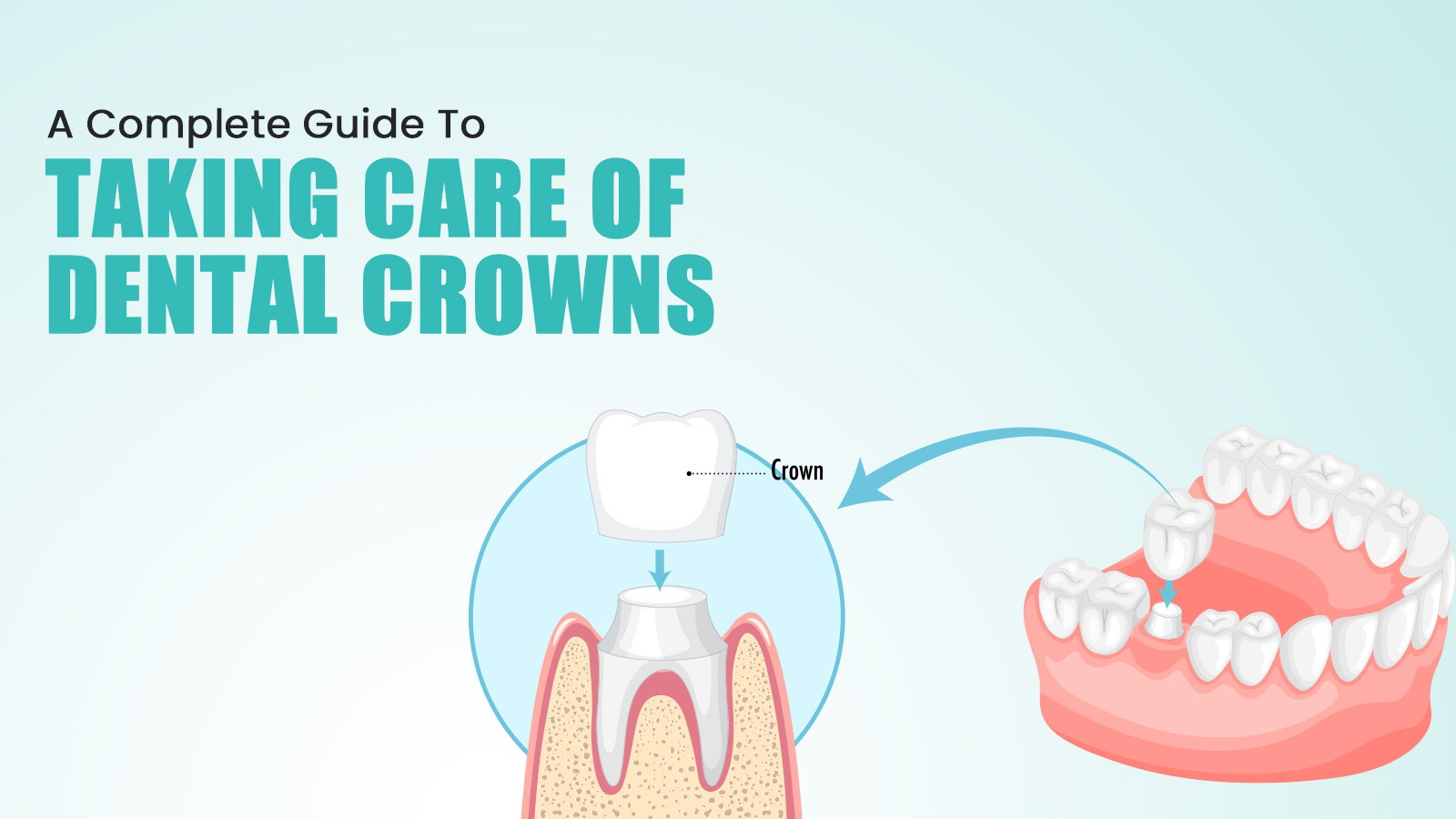
Did you know a dental crown has a lifespan of around 5 to 15 years? But, often these reliable teeth guards are taken for granted and neglected. They get cracked or damaged much earlier, forcing you to replace them.
Whether you have recently undergone a crown placement or are considering one, it is crucial to take proper care of them, like your natural teeth, following the advice of your dentist. If you are among those who are unsure how to maintain your dental crowns, this article is perfect for you.
Read on to learn how a proper care regimen can increase your dental crowns’ longevity and help you avoid the unnecessary expenses associated with replacing your crowns frequently. Before that, we will also help you learn all about dental crowns, their types, and their importance in maintaining your oral health.
Understanding Dental Crowns
A dental crown plays a big role in keeping your smile radiant, serving as a protective shield for broken or worn-out teeth and filling the gaps left by missing teeth. They are tooth-shaped caps made from a variety of materials like resin, metal, and porcelain.
Types of crowns
Let us get familiar with the different types of crowns:
- Metal crowns: Metals like gold, chromium, and palladium are used by dentists to create dental crowns. Though they rarely break or chip and are long-lasting, they are not a favourite because of their metallic colour. They are usually preferred for molars situated at the back of your mouth.
- Ceramic or porcelain crowns: These crowns are easily the favourite as they closely resemble your natural teeth. Moreover, these crowns are suitable for people who are allergic to metals. They are also gentler on the neighbouring teeth.
- PFM crowns: Porcelain-fused-to-metal or PFM crowns blend the durability of metal crowns and the aesthetic looks of porcelain crowns. However, these crowns have some disadvantages like the possibility of losing the porcelain coating and exposing the metal underneath. They may even wear down the enamel of the opposing teeth while closing the mouth.
- Zirconia crowns: They are easily the most popular among crowns for their superior strength and durability. Zirconium crowns allow light to pass through them, giving them a natural look. They are made using zirconium dioxide, a metal compatible with the human body, making them ideal for people allergic to metal crowns.
Purpose and Benefits of Dental Crowns
Apart from filling up for broken or missing teeth, dental crowns are used to cover dental implants, stained or discoloured teeth, and teeth treated through root canal treatment. In addition to their cosmetic roles, they also save your tooth from further damage.
Here are their benefits
- Safeguard weak teeth and support cracked ones
- Hold dental bridges in their positions
- Restore broken-down teeth
- Improve the smile by filling gaps in teeth
- Shield teeth from erosion and wear and tear
Daily Care for Dental Crowns
Oral hygiene practices are a must if you want your dental crown to be in perfect condition for years to come. With a proper care routine, your crowns will stay strong, keep your mouth hygienic, and prevent unwanted health issues. Note down these steps to take care of and maintain your crown on a daily basis:
- Skip sugary treats: Sugary foods foster the growth of harmful bacteria that can cause cavities in your mouth. This can lead to decay around your dental crown. If you are wearing a dental crown, avoid sugary foods as much as possible. Even if you indulge once in a while, remember to remove any leftover residue by gargling, flossing, and brushing.
- Brushing: Opt for a toothbrush that has soft bristles and a non-abrasive toothpaste for brushing. Take care to gently brush around the crown area to prevent plaque build-up. The chewing area of your dental crown must be brushed twice a day for two minutes, with the bristles angled towards the gum tissue to remove the plaque below your gum line.
- Protect from trauma: It’s vital to protect your dental crown from any potential injury or trauma. Be extra careful when playing sports or doing activities that could lead to a blow to your face. Wearing protective gear, such as a mouthguard, will minimize the risk of damage to your crown.
- Flossing: To prevent gum disease and preserve its health, make flossing a daily habit. Flossing dislodges food debris and plaque from the areas where the gum and the crown meet. Use dental floss or interdental brushes for better results while taking care not to snag the floss on the edges of the crown.
- Rinsing: In addition to brushing and flossing, rinse your mouth with an effective mouthwash, preferably one with antibacterial properties. Doing so will get rid of any lingering bacteria and keep your mouth fresh. Ask your dentist to recommend a suitable mouthwash for best results.
Avoiding Damage
Often the damage caused to dental crowns is avoidable and happens due to lack of knowledge regarding factors like the habits or foods to avoid.
- Hard Foods: Eating hard foods damages your crown due to wear and tear. You need to avoid foods like almonds or hard candies and crunchy foods. Many people damage their crowns due to their habit of biting on fingernails or hard objects like pencils. Such habits can exert excessive force on your crowns causing them to break or chip.
- Bruxism (Teeth Grinding): If you clench or grind your teeth at night, your crown can get worn out over time, leading to a crown fracture or, in some cases, even a root fracture. Wearing a customized mouthguard while sleeping can protect your crown and teeth.
- Chewing habits: if you have temporary crowns, it is advisaible to chew on the side of your face without the crown. This will minimize the chances of dislodging or damaging your crown. Prefer to eat cooked rather than raw vegetables.
Dealing with Common Issues
Often, your dental crown can experience issues like those mentioned below, for which you need to take the right course of action after consulting your dentist.
- Sensitivity: Some people experience sensitive teeth initially after receiving dental crown treatment. If you feel any discomfort or if your crown is too high when biting, you will need to get your dentist to make some adjustments.
- Loose Crown: Sometimes, your crown can become loose if the cement used to bind it has weakened. In such cases, it is prudent to see your dentist so that he or she can determine the cause of your moving crown and rectify it to prevent any damage to the tooth below it.
- Chips or Cracks: If you have a porcelain crown, there is the possibility of it getting chipped or developing a crack. Though small chips can be restored, longer or multiple chips indicate that you need a new crown.
Long-Term Care Tips
Like your teeth, your dental crown needs a proper care routine if it is to stay in pristine condition. Here are the factors to take care of:
- Healthy Diet: It is important to eat a diet rich packed with vital nutrients to support your overall oral health and to maintain your crown and the neighbouring teeth. Calcium and vitamin D are two important nutrients that will strengthen your bones and teeth. Incorporate vitamins C and A to support gum health and aging. Carrots, broccoli, leafy greens, cheese, citrus fruits, and apples are foods rich in a variety of nutrients needed for your oral health.
- Hydration: Getting sufficient hydration encourages saliva production, which is crucial for oral health. Saliva washes away food particles, plaque, and bacteria that may be building up between your crown and teeth, preventing cavities and gum disease. Moreover, drinking water removes food particles that often get stuck in and around your crowns.
- Oral Hygiene Routine: Following a regular dental routine based on your dentist’s advice can ensure your crown’s good health and longevity. Schedule visits to your dentist to catch issues early and receive personalized guidance.
Conclusion
By following these dental crown maintenance tips, you can keep your crown in optimum health and increase its lifespan. If you have concerns about how to take care of your dental crowns, schedule a visit to your dentist.
At Gnathos Dental, our team of caring professionals offers personalized guidance based on the type of crown you are wearing and supports your journey toward better oral health. We evaluate your crown thoroughly to check if it isn’t causing discomfort and adjust the placement if needed to prevent lasting damage. Moreover, we spot potential problems with your oral health to give you a better chance to avoid significant dental issues in the future.
- Tags:
- Dental Crowns


